MESOTHELIOMA
What Is Mesothelioma?
Malignant mesothelioma is a form of cancer caused by asbestos exposure that most commonly develops in the lining of the lungs, known as the pleura. Mesothelioma cancer can also affect the lining of the abdomen. In rare instances, tumors may develop in the lining of the heart or testes. It’s an aggressive disease, but treatments like surgery, chemotherapy, and immunotherapy have helped patients live longer, fuller lives after a diagnosis.
Key Facts on Malignant Mesothelioma
Manufacturers of asbestos-containing products hid the link between asbestos and mesothelioma for decades to keep making profits. As a result, millions of civilian workers, military personnel, and their families were exposed to asbestos without knowing the risks.
- About 3,000 Americans are diagnosed with mesothelioma each year.
- Patients typically report a gradual increase in symptoms like cough, shortness of breath, and fluid buildup.
- Veterans make up roughly 30% of all mesothelioma cases.
- Patients and family members may qualify for legal compensation averaging over $1 million.
How Does Asbestos Exposure Cause Mesothelioma?
It takes 10 to 50 years after asbestos exposure for mesothelioma to develop.
The process includes four key stages:
- Exposure – When asbestos is disturbed, people may inhale or ingest fibers.
- Buildup – Asbestos fibers become lodged in the protective linings of organs and accumulate with repeated exposure.
- Damage – Asbestos fibers irritate healthy tissue and cause inflammation.
- Cancer – Over time, the irritation can cause cancerous tumors to form.
Anyone exposed to asbestos — directly or secondhand — is at risk of developing mesothelioma and other diseases like lung cancer or asbestosis later in life.
Get our Free Mesothelioma Guide to learn about common sources of asbestos exposure, signs and symptoms, and much more.
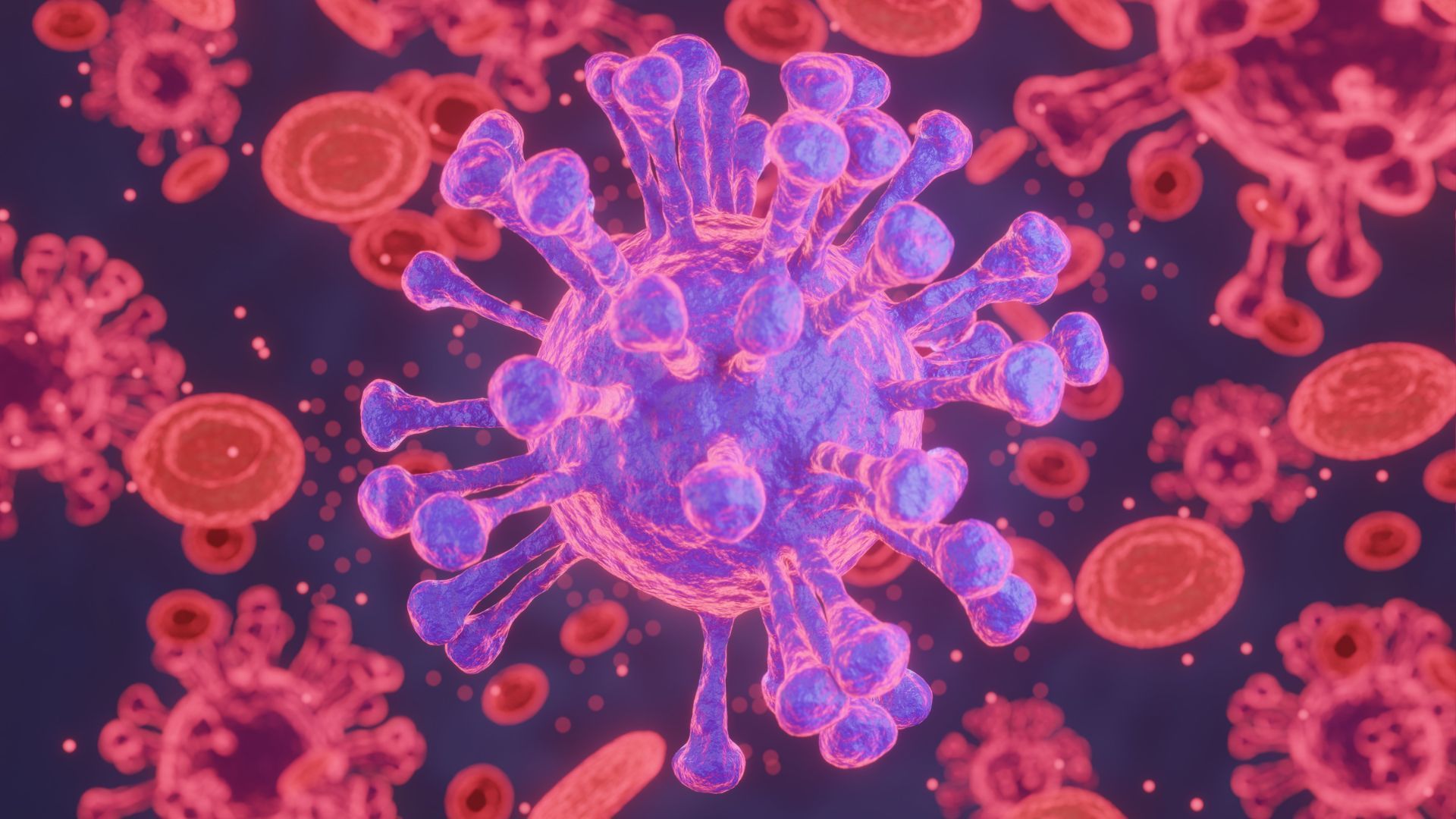
Malignant Mesothelioma Symptoms
The symptoms of mesothelioma can vary based on where the cancer forms in the body. However, there are some general mesothelioma symptoms that are common among patients.
These include:
- Abdominal pain and/or chest pain
- Fever
- Fluid buildup in the chest (pleural effusion)
- Fluid buildup in the abdomen (ascites)
- Loss of appetite
- Nausea and vomiting
- Night sweats
- Persistent cough
- Shortness of breath
- Weight loss
If the cancer is caught in the early stages, most patients experience mild and vague symptoms. Once the cancer starts to spread, more severe systemic symptoms (symptoms affecting the entire body) may appear.
Malignant Mesothelioma Symptoms
The symptoms of mesothelioma can vary based on where the cancer forms in the body. However, there are some general mesothelioma symptoms that are common among patients.
These include:
- Abdominal pain and/or chest pain
- Fever
- Fluid buildup in the chest (pleural effusion)
- Fluid buildup in the abdomen (ascites)
- Loss of appetite
- Nausea and vomiting
- Night sweats
- Persistent cough
- Shortness of breath
- Weight loss
If the cancer is caught in the early stages, most patients experience mild and vague symptoms. Once the cancer starts to spread, more severe systemic symptoms (symptoms affecting the entire body) may appear.
Types of Mesothelioma
Peritoneal Mesothelioma (Abdominal Lining)
Illustration of peritoneal mesothelioma
Peritoneal mesothelioma is the second most common type of this cancer, making up 10% to 15% of all cases, according to MD Anderson Cancer Center. This type of mesothelioma develops in the abdominal lining, also known as the peritoneum.
Because peritoneal mesothelioma doesn’t directly affect the heart or lungs unless it spreads, patients diagnosed with this type often have higher survival rates than those with pleural mesothelioma.
More than half of patients live at least 5 years after diagnosis if they undergo cytoreductive surgery with HIPEC (hyperthermic intraperitoneal chemotherapy), according to a 2022 article in the Journal of Clinical Haematology.
Pericardial Mesothelioma (Heart Lining)
Pericardial mesothelioma forms in the pericardium, which is the tissue surrounding the heart. This type of cancer makes up less than 1% of all mesothelioma cases and has a poor prognosis.
A 2021 study found that pericardial mesothelioma patients have an average life expectancy of 2 months.
Testicular Mesothelioma (Testicle Lining)
Testicular mesothelioma develops in the lining of the testes, also called the tunica vaginalis. Only 151 cases of testicular mesothelioma have been reported over the past 11 years. Despite it being a rare diagnosis, it is highly treatable.
According to a report published in the journal Environmental Health, the average life expectancy with testicular mesothelioma is 46.7 months.
Pleural Mesothelioma (Lung Lining)
Illustration of pleural mesothelioma
Malignant pleural mesothelioma forms in the lining of the lungs and chest wall. This type makes up over 75% of reported mesothelioma cases, according to the American Cancer Society (ACS).
Pleural mesothelioma is characterized by four stages. Early stages of mesothelioma typically mean the cancer is limited to the chest area and hasn’t spread to nearby lymph nodes. Later stages of pleural mesothelioma can spread to distant organs.
The staging of pleural mesothelioma helps doctors determine the type of treatment a patient will receive. Early stages are easier to treat with pleural mesothelioma surgery.
The Four Stages of Mesothelioma Cancer
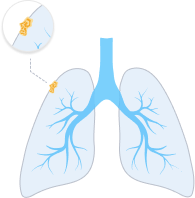
Stage 1
- Cancer has not yet spread beyond the lung lining.
- The average life expectancy is 21 months.
- Surgery is often indicated and may increase survival time by several months or years.
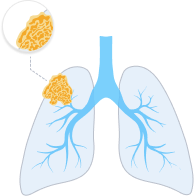
Stage 2
- Cancer has spread outside of the lung lining, possibly into nearby lymph nodes.
- The average life expectancy is 19 months.
- Surgery is often explored as a treatment option to help patients live longer.
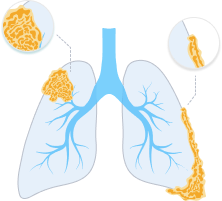
Stage 3
- Cancer has spread into nearby tissues, organs, or lymph nodes.
- The average life expectancy is 16 months.
- Treatments focus on slowing disease spread and managing pain.
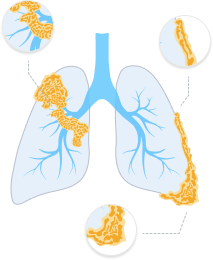
Stage 4
- Cancer has invaded distant parts of the body.
- The average life expectancy is 12 months.
- Palliative (pain-relieving) care can help patients who aren’t eligible for treatment.

How Do I Know If I Have Mesothelioma?
You can confirm whether you have mesothelioma by making an appointment with a specialist for a diagnosis.
Mesothelioma doctors take the following steps to diagnose this cancer:
- Physical exam: Patients complaining of possible mesothelioma symptoms should get a physical and tell their doctor about prior asbestos exposure.
- Imaging tests: Doctors will order chest X-rays, computed tomography (CT) scans, and/or magnetic resonance imaging (MRI) to look for signs of mesothelioma, like pleural thickening and fluid around the lungs.
- Biopsy: A biopsy is the only way to confirm a diagnosis of mesothelioma. During a biopsy, a pathologist examines a fluid/tissue sample under a microscope to see if it contains malignant (cancerous) mesothelial cells.
How Do I Know If I Have Mesothelioma?
You can confirm whether you have mesothelioma by making an appointment with a specialist for a diagnosis.
Mesothelioma doctors take the following steps to diagnose this cancer:
- Physical exam: Patients complaining of possible mesothelioma symptoms should get a physical and tell their doctor about prior asbestos exposure.
- Imaging tests: Doctors will order chest X-rays, computed tomography (CT) scans, and/or magnetic resonance imaging (MRI) to look for signs of mesothelioma, like pleural thickening and fluid around the lungs.
- Biopsy: A biopsy is the only way to confirm a diagnosis of mesothelioma. During a biopsy, a pathologist examines a fluid/tissue sample under a microscope to see if it contains malignant (cancerous) mesothelial cells.
Treatment Options for Malignant Mesothelioma
All patients can benefit from mesothelioma treatment in some way, whether to potentially increase their life expectancy or reduce symptoms. Which treatments will work best depends on many patient health factors, such as the type and stage of their cancer.
These treatment methods include:
- Chemotherapy can be used as a standalone treatment or combined with surgery to kill remaining cancer cells. Patients usually receive chemotherapy in cycles over several weeks or months.
- Clinical trials are constantly testing newer treatments like targeted therapy and cancer vaccines to see if they can help mesothelioma patients live longer.
- Immunotherapy works by boosting the body’s immune system to target mesothelioma cells. Opdivo® (nivolumab) and Yervoy® (ipilimumab) are the two immunotherapy drugs currently approved for mesothelioma.
- Palliative care helps patients manage pain and improve their quality of life. Palliative treatments are often used throughout a patient’s diagnosis.
- Radiation therapy uses high-energy beams to damage the DNA of cancer cells and shrink cancerous tumors.
- Surgery for mesothelioma is performed with the goal of removing tumors and any surrounding tissue affected by the cancer.
- Tumor Treating Fields are adhesive patches that are attached to the chest and generate electricity. The electrical waves disrupt mesothelioma’s ability to spread. This treatment has few side effects and is combined with chemotherapy.
Popular Questions
Got a question? We’re here to help.
-
Is mesothelioma cancer?
Yes, mesothelioma is a type of cancer caused by breathing in or swallowing asbestos fibers. Over decades, asbestos can cause healthy cells in the body to mutate and become cancerous.
Roughly 3,000 people are diagnosed with mesothelioma in the U.S. each year, according to the American Cancer Society.
-
What type of cancer is mesothelioma?
Mesothelioma is a type of cancer that affects different parts of the mesothelium, which is the thin layer of tissue that lines most of the body’s internal organs.
It can occur in various parts of the body, but the most common form is pleural mesothelioma, which affects the lining of the lungs (pleura).
Other less common types include peritoneal mesothelioma (affects the abdominal lining), pericardial mesothelioma (affects the heart lining), and testicular mesothelioma (affects the lining of the testicles).
-
What triggers mesothelioma?
Mesothelioma is primarily triggered by exposure to asbestos, a naturally occurring mineral that was widely used in various industries for its heat resistance and insulating properties.
When asbestos fibers are released into the air and breathed in or swallowed, they can become trapped in the lining of the lungs, abdomen, or other organs, leading to inflammation, scarring, and eventually the development of mesothelioma cancer.
If you or a loved one has mesothelioma, our team can help determine when, where, and how your asbestos exposure happened and see if you qualify for compensation. Call (855) 299-2694 to get started.
-
Is mesothelioma painful?
Mesothelioma can cause painful symptoms, but the level of discomfort is unique to each patient and can fluctuate based on the stage of the disease.
In advanced stages, patients can have more severe chest pain from tumors pressing against nearby tissues or organs.
Contact Us
We will get back to you as soon as possible.
Please try again later.
Frequently Asked Questions
Have some questions? Find answers below, or give us a call at (800) 995-7714.
-
What tests do you offer?
At Drawn to Helping Others, we offer a variety of tests, including DOT and NON-DOT testing and DNA paternity testing. If you need lab tests other than a DOT and NON-DOT test or paternity test, please call us today to see how we can help with your testing.
-
How do I schedule an appointment?
We are happy to help! Scheduling is easy. Choose from the options below, and one of our trained professionals will assist you:
Call us at 860-983-0708.
Submit an appointment request with our online form.
Or email us at drawntohelpingothers@gmail.com.
